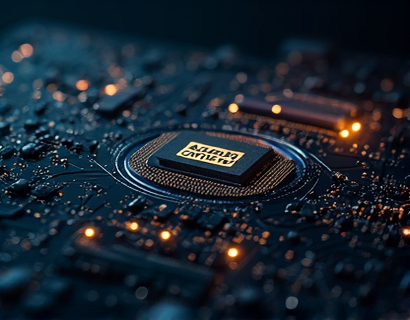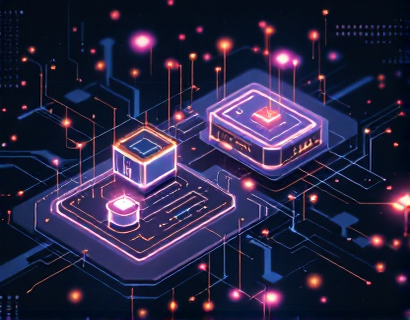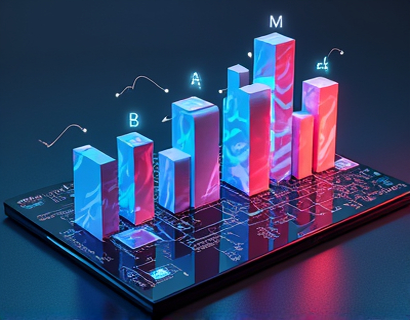Optimizing Oracle Management and Blockchain Service Access for Developers and Businesses
In the rapidly evolving landscape of blockchain technology, developers and businesses are constantly seeking innovative solutions to enhance their operations and stay ahead of the curve. One critical aspect of blockchain development is the management of oracles and the access to blockchain-based services. This article delves into the cutting-edge software solutions designed to optimize oracle management and facilitate seamless access to blockchain services, thereby unlocking the full potential of decentralized applications.
Understanding Oracle Management in Blockchain
Oracles play a pivotal role in blockchain ecosystems by serving as bridges between the blockchain and external data sources. They provide real-time data to smart contracts, enabling them to make informed decisions based on off-chain information. However, managing these oracles can be complex, involving challenges such as data accuracy, security, and latency. Effective oracle management is crucial to ensure that smart contracts operate reliably and efficiently.
Challenges in Oracle Management
Developers and businesses face several challenges when managing oracles. These include ensuring the integrity and accuracy of data, maintaining the security of data transmission, and minimizing latency to support real-time applications. Additionally, the decentralized nature of blockchain requires oracles to be trustless and resilient to single points of failure. These challenges, if not addressed, can lead to vulnerabilities and inefficiencies in blockchain-based systems.
Efficient Oracle Management Solutions
To address these challenges, advanced software solutions have emerged to streamline oracle management. These solutions offer a comprehensive approach to data integration, security, and performance optimization. By leveraging these tools, developers and businesses can create more robust and reliable decentralized applications.
Data Integration and Accuracy
One of the primary functions of these solutions is to ensure accurate and timely data integration. They achieve this through sophisticated data validation and verification processes, cross-referencing data from multiple sources to enhance reliability. This multi-source verification helps in reducing the risk of data tampering and ensures that smart contracts receive accurate information.
Security Enhancements
Security is a paramount concern in oracle management. Advanced solutions implement robust encryption protocols and secure communication channels to protect data in transit. They also employ decentralized trust models, such as multi-signature wallets and reputation systems, to mitigate the risk of single points of failure and enhance overall security.
Latency Reduction
Real-time applications demand low latency to function effectively. Cutting-edge oracle management solutions optimize data retrieval and transmission processes to minimize latency. Techniques such as caching, efficient routing algorithms, and edge computing are employed to ensure that data is delivered swiftly and reliably, supporting the performance of decentralized applications.
Accessing Blockchain Services
Beyond oracle management, accessing blockchain services efficiently is essential for developers and businesses. This involves not only interacting with smart contracts but also managing transactions, monitoring network status, and integrating various blockchain functionalities into applications.
Streamlined Service Access
Advanced software solutions provide a unified interface for accessing a wide range of blockchain services. These platforms abstract the complexities of blockchain interactions, allowing developers to focus on building innovative applications rather than managing low-level details. This streamlined access enhances productivity and accelerates development cycles.
Smart Contract Development Tools
For developers, these solutions offer powerful tools to design, deploy, and manage smart contracts. Features such as code templates, debugging tools, and version control integration simplify the smart contract development process. Additionally, these platforms often include testing environments to ensure that smart contracts function as intended before deployment.
Integration with Decentralized Applications
Integrating blockchain services into decentralized applications (dApps) requires seamless connectivity and interoperability. Advanced solutions provide APIs and SDKs that facilitate easy integration, enabling developers to build scalable and secure dApps. These tools support various blockchain networks, ensuring flexibility and broad compatibility.
Benefits of Advanced Oracle Management and Service Access Solutions
The implementation of advanced oracle management and service access solutions brings numerous benefits to developers and businesses. These benefits extend beyond technical improvements to include strategic advantages in the competitive blockchain landscape.
Enhanced Reliability and Trust
By ensuring accurate and secure data transmission, these solutions enhance the reliability of smart contracts and decentralized applications. This reliability builds trust among users and stakeholders, which is crucial for the adoption and success of blockchain-based projects.
Increased Efficiency and Productivity
Streamlined data integration and access to blockchain services reduce the time and effort required for development and maintenance. This increased efficiency allows teams to focus on innovation and value addition, leading to faster time-to-market and higher productivity.
Scalability and Flexibility
Advanced solutions are designed to scale with growing demands, supporting large-scale deployments and complex applications. They also offer flexibility in integrating with various blockchain networks and protocols, making them suitable for a wide range of use cases.
Cost Reduction
By optimizing oracle management and service access, these solutions can help reduce operational costs associated with data acquisition, security measures, and maintenance. This cost efficiency is particularly beneficial for businesses looking to maximize their return on investment in blockchain technologies.
Case Studies and Real-World Applications
To illustrate the practical impact of these solutions, consider a few real-world applications across different industries.
Supply Chain Management
In supply chain management, oracles can provide real-time data on product locations, inventory levels, and shipping status. Advanced management solutions ensure this data is accurate and secure, enabling transparent and efficient tracking throughout the supply chain. This enhances trust among partners and improves overall operational efficiency.
Financial Services
In the financial sector, oracles can feed real-time market data into smart contracts for automated trading and risk management. Secure and reliable data access is crucial for executing trades accurately and swiftly, reducing the risk of errors and fraud.
Healthcare
In healthcare, oracles can integrate patient data from various sources to support decentralized health records and telemedicine applications. Ensuring the accuracy and privacy of this data is essential, and advanced solutions provide the necessary tools to achieve this.
Future Trends and Innovations
The field of oracle management and blockchain service access is continually evolving, with several trends and innovations on the horizon.
Interoperability Standards
As the blockchain ecosystem grows, the need for interoperability standards becomes increasingly important. Future solutions will likely focus on creating standardized protocols for oracle communication and service access, facilitating seamless integration across different blockchain networks.
AI and Machine Learning Integration
The integration of AI and machine learning with oracle management solutions is another promising area. These technologies can enhance data analysis, predict potential issues, and automate routine tasks, further improving the efficiency and reliability of blockchain systems.
Decentralized Oracle Networks
Decentralized oracle networks are gaining traction, offering a trustless and community-driven approach to data provision. These networks leverage the collective power of multiple oracles to ensure data integrity and security, reducing reliance on single entities.










































